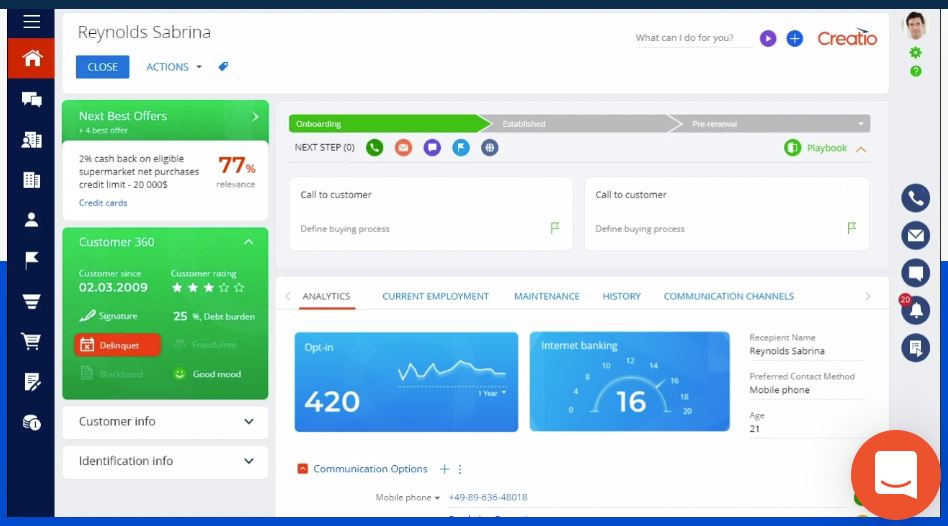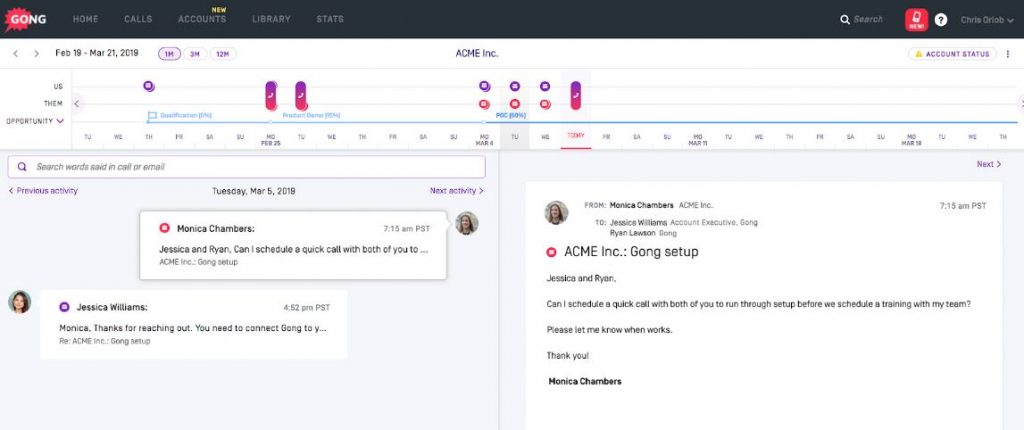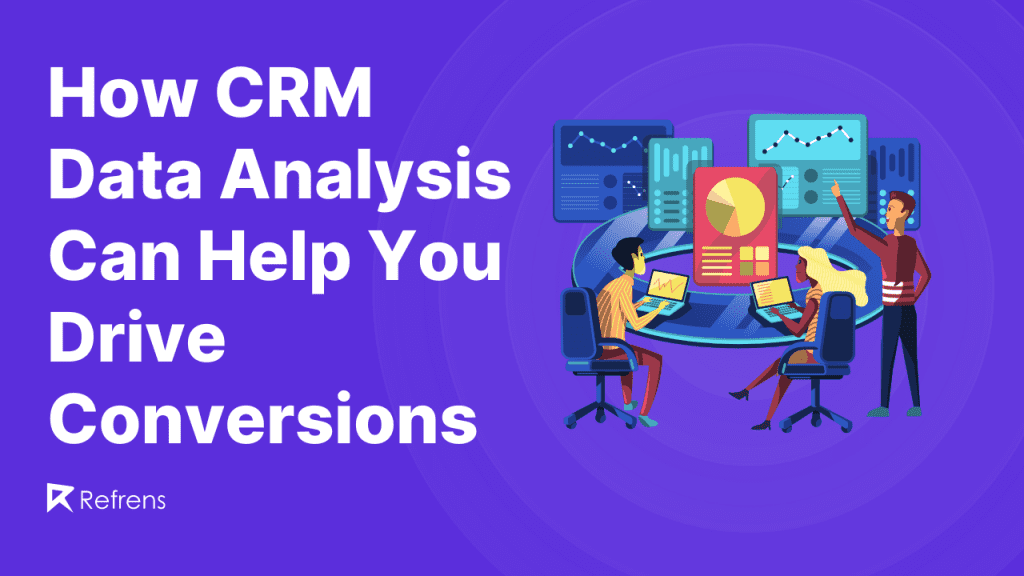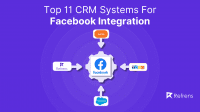Customer Relationship Management software helps you gather data on your customers from the first contact to conversion. It also helps you maintain your relationships with customers afterward. Thanks to sales CRM software, you can stay on top of your customer journey in one centralized platform.
Data proves the importance of using CRM. Research revealed that CRMs boost sales by up to 29%. Moreover, CRM helps boost companies’ sales productivity by 34% and improves forecast accuracy by 42%.
CRM data can help your business in many ways. When you analyze your CRM data, you can, ultimately, drive conversions. Read on to learn how CRM data analysis does this for you:
1. Helps You Identify Ideal Clients
CRM data analysis can help you identify your ideal clients. Your ideal client is likely to buy your product or service. From a marketing perspective, your ideal client is someone you want to reach out to with your marketing offers and promotions to generate the results you’re looking for.
CRM holds data on your customers. This data tells you whether a consumer will be a waste of your marketing efforts. Tracking consumer activity in your CRM will help you identify patterns and record sales trends around specific data segments. For instance, you might notice that 24-year-olds convert faster than teenagers.
You can derive valuable insight, then, that you should focus your efforts on these customers if you want to drive conversions quickly.
Don’t just focus on customers’ age. In your sales CRM, look at the other characteristics of consumers who convert easily. Maybe females convert faster than males? Perhaps college graduates are more interested in your product than those who finished high school.
Then put all these characteristics together to create a buyer persona. The screenshot above shows a CRM solution showing one such customer profile:

Your buyer persona is a visual representation of your ideal client. It can guide you in everything from your marketing to sales strategies.
2. Boosts Your Customer Service
Spot-on customer satisfaction is critical to any business. Excellent customer service will help you keep your customers happy and drive conversions. This is critical as 1 in 3 customers leaves a brand they love after having just one bad experience. Integrating helpdesk software can help ensure your customer service remains consistent and efficient.
Using CRM data analysis tools and customer service automation can help businesses with customer management processes. You can integrate CRM data analysis in customer service environments to understand customer requirements better. Based on what you know, you can improve your customer service strategy.
So, for example, your CRM can show you the number of times a customer contacted your customer support team with an issue they’ve had with one of your products. Assume, for instance, that they find it difficult to use the product. Knowing that from your CRM allows you to create relevant resources that break down the relevant process for your customer. As a result, when someone else contacts you with the same problem, you can just send them the resource.
The screenshot below shows the CRM interface that records and analyzes customer interactions. The software will alert the user about the risks and opportunities detected across their business.

The feedback management within your CRM also makes it easy to discover problems within your customer service system so you can quickly address them. For instance, you might see that an agent took too long to resolve a customer issue. You can then train your customer service agents to ensure they are better equipped to handle such situations.
Analyzing digital marketing data and CRM data can help you see your customers’ favorite means of communication. They may prefer to reach out to you with their concerns via phone calls, Facebook, email, or live chat. When you know their preferred method of communication, you can set up automatic responses to ensure your customers get attended to even when your customer service agents are not on duty. That can help you generate even more plus points in the eyes of the customer. And if you respond via social media for everyone to see, you can even get Instagram likes, Facebook shares, and LinkedIn comments, boosting your overall social media engagement.
As a business owner, you need to remember that customer service plays a significant role in your brand reputation. CRM data analysis can help ensure your customer service remains top-notch.
3. Enhances Email Marketing Efforts
Sending out interactive emails is an excellent way of reaching target customers at a low cost. CRM data analysis can help ensure you have a robust email marketing strategy. When you analyze CRM data, you can notice patterns among your current clients. This is information you can use to enhance your email marketing tactics and drive conversions.
CRM platforms are powerful tools that can help you segment your customer base. Customer segmentation means dividing your list into small groups with similar characteristics. CRM analytics creates customer segments by age, gender, and spending habits, among other things.
With a segmented list, you can send targeted email marketing campaigns. Around 62% of customers are likely to click on a marketing email with a personalized subject line. Plus, 72% say they only respond to emails that are relevant to them.
Thanks to CRM data analysis, you can give every single customer what they want and need at the right time. For example, you can identify your loyal customers and email them discounts. You can also send them birthday emails to build customer loyalty. Just get your current customers’ birthdays from your CRM data analysis. Here’s an example of such an email:

Your CRM data will help you design engaging email campaigns. But that doesn’t mean you’ll no longer monitor their performance. Set up email tracking in Google Analytics so you can gain insights into exactly how recipients interact with your emails and, subsequently, your site. Then you can make the necessary adjustments to further improve your campaigns.
CRM analysis doesn’t just help you create your emails for your campaigns. It helps you effectively gather the email addresses you need to run your campaigns in the first place.
CRM data analysis allows you to customize your lead magnet based on your target subscriber’s pain points. You’re more likely to get people to sign up to your email list with this type of lead magnet than with a generic one.
All this isn’t to say you’ll rely only on your incentive to get people to sign up. You still need to focus on the web page or the landing page that hosts your lead magnet, of course. The sign-up form on your web page should be simple and easy to fill out. Your landing page should also incorporate quality supplementary visuals and load quickly at the same time. Seek the help of a web design agency with proven experience for this. You can also use excellent landing page builders such as Instapage or alternatives to Instapage for the best signup results.
4. Helps You Identify Other Effective Marketing Strategies
With CRM, businesses can centralize data collection. This makes it easier to analyze trends and determine which other marketing platforms apart from email–your website, social media, and text, among others—work.
So for example, if the analysis of your CRM data indicates that social media, in particular, Facebook, brings you the most leads, you can run your user-generated campaign on that channel. If you notice that spending money on Google ads isn’t generating new leads for you, you can decide to scrap that.
With CRM data analysis, you can also determine what specific products to market to specific customers via these other marketing channels to increase their chances of buying from you. From your CRM data analysis, after all, you can determine the products your existing customers are likely to be interested in. So, your upselling or cross-selling efforts are likely to be successful.
CRM analysis doesn’t just help you tailor your email messaging for the best results. It also helps you customize your messaging on these other marketing platforms.
Assume you’re a company selling financial instruments. If you notice from your CRM data analysis that many of those who bought your products did so after viewing your social media ads on financial security, you’ll highlight these values more across your other marketing collateral to hopefully replicate the results.
5. Aids in Sales Forecasting
With CRM data analysis, you can predict the likelihood a potential customer converts. You can also determine the estimated time it should take for a prospect to go through the buyer journey.
All this information enables you to create accurate sales forecasts. Sales forecasts are critical to an entire company’s business operations. When you generate accurate sales forecasts, you can allocate your resources efficiently to drive conversions.
For instance, if you predict you’ll sell X in one year, you can ensure you have the proper amount of stocks of that product on your shelves. When you ensure there’s adequate supply to meet demand, you can prevent a scenario where people who wanted to buy your product were unable to do so. As a result, you prevent the emergence of disgruntled customers and protect your brand reputation overall.
With an accurate sales forecast, you can also easily determine how many sales account managers, customer support staff members, and in-store staff, among others, you’ll need to hire to ensure you meet your customers’ needs.
An accurate sales forecast will also typically give you data on which prospects are likely to drop off and not convert in the end. This information can help you make adjustments to your sales strategies so you can meet your sales targets early on.
Sales forecasts are important. They help you make informed decisions about your business. If your data is chaotic, or you misinterpret data and reports, your sales forecasts will be unreliable. This can result in you making decisions that can negatively impact the business.
CRM tools can help your company generate accurate sales forecasting reports like the one above while maintaining data integrity.
6. Ensures Overall Customer Satisfaction
CRM software provides contextual data you can analyze to drive overall customer satisfaction. This, in turn, can help drive conversions.
For example, if a customer interested in making a repeat purchase approaches a sales agent, they won’t have to give a backstory of their experience with the company. Since the sales team has access to the CRM, they can easily analyze the customer’s previous interactions with the brand and respond given the proper context. For the consumer who managed to save time (they didn’t have to explain anything, after all), that translates to a great customer experience.
CRM can also track and measure common customer happiness with your brand.
By analyzing customer feedback in your CRM, you can immediately know if there’s a problem with your products, your website, or payment gateway. With these deep insights, you can quickly make adjustments to prevent further issues and ensure customer satisfaction.
In Closing
CRM data analysis can help businesses in many ways.
When you analyze CRM data, you can identify your ideal clients and focus your marketing efforts on them, ultimately reducing sales costs. Analyzing CRM data can also help you improve your email marketing strategy. It can help you create a customized lead magnet that can ensure you gather the email addresses you need effectively. Also, it can help you personalize your marketing emails so that your overall messaging resonates with your subscribers.
Thanks to CRM data analysis, you can also come up with other marketing strategies that work. You can customize the products and services to offer customers to boost the chances of them making a purchase. You can also determine what other marketing platforms to use for the best results.
A CRM data analysis can also help you get an accurate sales forecast that will help you make effective decisions. Finally, with a CRM data analysis, you can ensure overall customer satisfaction. After all, every department can be made aware of every customer’s previous interactions with the brand. The result is that they can always respond appropriately.
Bottom line, perform a CRM data analysis now, and you’ll certainly drive conversions. Good luck!


















